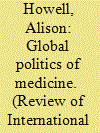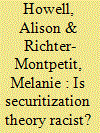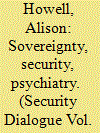|
|
|
Sort Order |
|
|
|
Items / Page
|
|
|
|
|
|
|
| Srl | Item |
| 1 |
ID:
114567


|
|
|
|
|
| Publication |
2012.
|
| Summary/Abstract |
This article raises questions about the possible waning of the authority of the diagnosis of posttraumatic stress disorder (PTSD). While avoiding predictions, it points to signs that the authority of PTSD is now being challenged by both the rise of resilience-based models and the increasing authority of biomedical and neurological approaches in the governance of trauma. It explores these challenges in various empirical sites, including humanitarian interventions, Western military settings (especially involving the US Army and North Atlantic Treaty Organization [NATO]), as well as civilian contexts, including national health services, emergency preparedness, schools, universities, and other sectors. The article concludes by stressing some of the troubling politics that surround these new developments, which, like the diagnosis of PTSD, may individualize and govern the experience of traumatic events, including war, in a broad context of social and economic austerity.
|
|
|
|
|
|
|
|
|
|
|
|
|
|
|
|
| 2 |
ID:
141065


|
|
|
|
|
| Summary/Abstract |
This article makes the case for a new field in International Relations (IR): the Global Politics of Medicine. It argues that significant avenues of research can be opened up by focusing on medicine and the life sciences, in order to both challenge current IR theories, and develop new theoretical and empirical insights in IR. In particular, the article challenges the validity of securitisation theory, and specifically the argument that health has been securitised. Showing instead that medicine and warfare have been imbricated from the nineteenth century as strategies of population, it challenges securitisation theory's ahistoricism and its assumption that social security and international security (and the norm/exception) are analytically divisible. Bringing this into the present through the examples of triage, psychological resilience, and genetic intelligence in counterinsurgency, it traces how warfare and medicine now ambitiously seek to treat populations as sets of individual bodies. Arguing that we cannot retreat to some mythical state of politics ‘prior’ to securitisation, it draws out how the fields of war, health, and medicine are nonetheless highly contested. The article concludes by challenging the fields of Global Health, war, and security studies, but also suggests novel routes for pursuing the study of the Global Politics of Medicine.
|
|
|
|
|
|
|
|
|
|
|
|
|
|
|
|
| 3 |
ID:
173879


|
|
|
|
|
| Summary/Abstract |
This article provides the first excavation of the foundational role of racist thought in securitization theory. We demonstrate that Copenhagen School securitization theory is structured not only by Eurocentrism but also by civilizationism, methodological whiteness, and antiblack racism. Classic securitization theory advances a conceptualization of ‘normal politics’ as reasoned, civilized dialogue, and securitization as a potential regression into a racially coded uncivilized ‘state of nature’. It justifies this through a civilizationist history of the world that privileges Europe as the apex of civilized ‘desecuritization’, sanitizing its violent (settler-) colonial projects and the racial violence of normal liberal politics. It then constructs a methodologically and normatively white framework that uses speech act theory to locate ‘progress’ towards normal politics and desecuritization in Europe, making becoming like Europe a moral imperative. Using ostensibly neutral terms, securitization theory prioritizes order over justice, positioning the securitization theorist as the defender of (white) ‘civilized politics’ against (racialized) ‘primal anarchy’. Antiblackness is a crucial building-block in this conceptual edifice: securitization theory finds ‘primal anarchy’ especially in ‘Africa’, casting it as an irrationally oversecuritized foil to ‘civilized politics’. We conclude by discussing whether the theory, or even just the concept of securitization, can be recuperated from these racist foundations.
|
|
|
|
|
|
|
|
|
|
|
|
|
|
|
|
| 4 |
ID:
152103


|
|
|
|
|
| Summary/Abstract |
Recent breakthroughs in neuroscience have led to increasing concern about its uses in warfare. This article challenges the primacy of dual-use frameworks for posing ethical questions concerning the role of neuroscience in national security. It brings together three fields – critical war studies, bio-ethics, and the history of medicine – to argue that such frameworks too starkly divide ‘good’ and ‘bad’ military uses of neurotechnology, thus focusing on the degradation of human capacities without sufficiently accounting for human enhancement and soldier rehabilitation. It illustrates this through the emergence of diagnoses of Traumatic Brain Injury and Polytrauma in the context of post-9/11 counterinsurgency wars. The article proposes an alternative approach, highlighting the historical co-production and homology of modern war and medicine so as to grapple with how war shapes neuroscience, but also how neuroscience shapes war. The article suggests new routes for thinking through the connections between war, society, science, and technology, proposing that we cease analysis that assumes any fundamental separation between military and civilian life.
|
|
|
|
|
|
|
|
|
|
|
|
|
|
|
|
| 5 |
ID:
164643


|
|
|
|
|
| Summary/Abstract |
This article argues that while Foucauldian security studies (FSS) scholarship on the biopolitics of security and liberal war has not ignored racism, these works largely replicate Foucault's whitewashing of the raciality and coloniality of modern power and violence. Drawing on Black, indigenous, postcolonial and decolonial studies, we show how Foucault's genealogy of biopower rests on an unspecified concept of the “human,” failing to account for how notions of “human” were constituted through the savage and slave other, how enslaved people were rendered into things, and how punitive, sovereign violence persists as a (settler) colonial technique of gratuitous, not merely instrumental, violence. FSS exacerbates these problems. This article challenges two core FSS propositions on liberal war: 1. that “human life cannot ever be secured,” which replicates Foucault's Eurocentric reliance on an unspecified “human” as the object of biopolitics; 2. that “everyone is (potentially) dangerous” and thus open to the punitive/lethal dimensions of liberal power, which reduces racism to a sorting process after the establishment of biopolitics and liberal war, rather than a precondition of it. This “methodological Whiteness” (Bhambra 2017a) results in major oversights in FSS empirical genealogies of: state violence, twenty-first-century digital and molecular revolutions, labor, capital, and enslavement.
|
|
|
|
|
|
|
|
|
|
|
|
|
|
|
|
| 6 |
ID:
137013


|
|
|
|
|
| Summary/Abstract |
This article traces the rise of military psychological resilience training, focusing on the US Army’s Comprehensive Soldier and Family Fitness program, which seeks to assess and instill resilience in soldiers and their families through techniques developed in the discipline of positive psychology. In maximizing the happiness, optimism, and mental fitness of soldiers, military resilience training has two aims: (1) to produce a fit fighting force capable of winning complex wars, and (2) to cut costs, not by averting war, but by ostensibly reducing the need for costly healthcare through a claim to prevent soldiers’ ‘pessimistic’ responses to war. The architects of military resilience are also exporting this model to the civilian sphere of social security, using their military experiment as ‘proof of concept’ of the scientific validity not only of resilience training, but also of positive psychology more generally. The article thus illustrates that ‘social security’ cannot be held separate from inter/national security, because these domains are, in practice, imbricated. It is argued that resilience is not merely a response to war and austerity, but a means for producing these forms of precarity through a fantasy of indomitability. The article concludes by considering the broader ethics of psychological resilience.
|
|
|
|
|
|
|
|
|
|
|
|
|
|
|
|
| 7 |
ID:
099565


|
|
|
|
|
| Publication |
2010.
|
| Summary/Abstract |
This article examines how psychiatry has been used as a technology of security in post-'liberation' Iraq. Drawing on Foucault and Foucauldian work on the history and sociology of medicine, it begins by tracing how, from the 19th century onwards, psychiatry has instantiated its authority through a claim to provide social security within national spaces, both through methods of sovereign confinement and through liberation and governance. Arguing that the various 'psy' disciplines - and medicine more generally - are increasingly used as technologies of security internationally, the article examines psychiatric practice in Iraq, where patients in the Al Rashad psychiatric institution were accidentally liberated from their confinement by US Marines in 2003. Iraq's 'mentally ill' were initially considered a manageable security threat and thus subject to liberal community governance efforts. Yet, after the so-called suicide bombing of two pet markets in 2008, reportedly by former Al Rashad patients, those deemed 'mentally ill' and others associated with them were once again made subject to sovereign confinement, marking a failure in liberal governance. Thus, this article seeks to explore some of the complex lines connecting sovereignty,
|
|
|
|
|
|
|
|
|
|
|
|
|
|
|
|
| 8 |
ID:
192988


|
|
|
|
|
| Summary/Abstract |
This article examines the #SdScandal: the backroom and public fracas surrounding an article on epistemic racism in classic securitization theory that we authored. It argues that what the #SdScandal illustrates is that disciplinary whiteness in international relations has been upheld not despite, but in part through, the ‘critical turn’. Using textual analysis as well as cyber-ethnographic and auto-ethnographic methods, it details how post-positivist knowledge-frames sometimes become vehicles for the rehabilitation of racial-colonial concepts, and how white femininities and novel tender masculinities can be evoked in the defence of institutional hierarchies. That such gendered shifts in disciplinary whiteness (seem to) depart from old-guard ‘white man’s IR’ (per Lake, 2016) only increases their efficacy in securing the status quo. The article further contextualizes this argument about international relations within the broad backlash against resurgent claims for racial justice both inside and outside the academy. It identifies political-intellectual convergences, not only between orthodox and some critical thought, but between right-wing and some self-identified liberal, leftist and/or feminist scholars, especially around the supposed threat of ‘cancellation’ of scholars and scholarship. Examining what critics of the #SdScandal called threats of retribution against this journal, it argues that at stake are issues of editorial independence and academic freedom, and, more broadly, contending visions of how to pursue anti-racism.
|
|
|
|
|
|
|
|
|
|
|
|
|
|
|
|
| 9 |
ID:
077540


|
|
|
|
|
| Publication |
2007.
|
| Summary/Abstract |
This article traces the pathologization of suspected terrorists held captive at the U.S. military base in Guantánamo Bay, Cuba. The occurrence of several reported suicide attempts among the detainees provided "proof" for their captors that terrorists are indeed fanatical madmen. These same reports of suicide attempts, however, were contradictorily diagnosed by human rights and humanitarian organizations as evidence of psychological deterioration induced by prolonged detention. What is notable in this diagnostic competition over what, exactly, afflicts the detainees is that both advocates and resisters to the detentions pathologized the detainees by chalking up the suicide attempts to their purportedly impaired psyches. This is significant because the pathologization of the detainees is one condition of possibility for their excision from the global body politic. Authoritarian practices, such as the incarceration of the "mad" and the detention of "suspected terrorists," are theorized as integral to global liberal governance, which divides up populations, and subjects those deemed mad, deviant, or dangerous to coercive measures in the name of order, security, and liberty. The article concludes with a consideration of the ways in which international relations (IR) could be more attentive to the operation of the "psy" disciplines in the conduct of international affairs
|
|
|
|
|
|
|
|
|
|
|
|
|
|
|
|
|
|
|
|
|